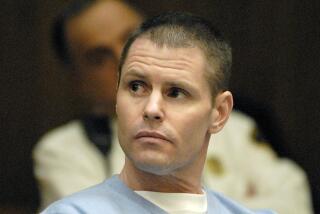Harbor City Youth Convicted in 1988 Drive-By Killing
- Share via
A Harbor City teen-ager was found guilty Friday of the murder of a 16-year-old boy who had been walking home from church in Wilmington last year. It was Hector Garcia’s third murder conviction in a month.
Garcia, who turned 18 in May, will return to Long Beach Superior Court Sept. 1 and could be sentenced to 27 years to life in prison for the murder of Rafael Pereda. He died March 22, 1988, in a drive-by shooting moments after he left a youth meeting at Holy Family Catholic Church.
Garcia also faces 37 years to life in prison for a double murder in a drive-by shooting in August, 1988, in Wilmington.
“Hopefully the judge will string the sentences together and he will get at least 64 years to life,” said Deputy Dist. Atty. Scott Carbaugh. Carbaugh said he would have sought the death penalty if Garcia had been an adult when he committed the crimes.
String of Killings
The Pereda murder was the seventh in a string of eight gang-related killings that hit the Harbor Area in the first three months of 1988. Pereda’s murder drew special attention because his death didn’t fit the stereotype of gang-vs.-gang killings.
Pereda, 16, lived on the east side of Wilmington. It was not unusual for him to attend a meeting at the church. Rafi, as friends and family knew him, lived among members of the Eastside Wilmas gang, but he was not one of them, police said.
His parents, Rafael Sr. and Alicia, said shortly after their son’s death that he liked to fight, but only with his fists.
Neighborhood kids and the police said Pereda didn’t involve himself with the drugs that destroyed many lives in his neighborhood. Instead he spent much of his time lifting weights and working out.
His parents built a special shelf in their living room to display the trophies and plaques he won in cross-country meets. At night, he would gaze at the stars with his telescope.
When he helped decorate a dog house for the family German shepherd, Rafi painted the masks of comedy and tragedy and wrote under them, “Smile Now” and “Cry Later.”
Hector Garcia was just 16 when he and his friends from Harbor City got into trouble.
A friend of Garcia said last week that his upbringing in the Normont Terrace housing project went against the usual warning signs of trouble. His father lived at home. His mother ran a clean and disciplined household. And brothers and sisters were leading responsible lives.
But the tall, gaunt youth got into trouble anyway, said the friend, who asked not to be identified.
“It’s a mystery why something like this happens,” he said.
But the rivalry between street toughs from Harbor City and Wilmington dates back decades.
It was warm the night of March 22 when Garcia suggested to buddies that they drive south for a night of “riding on the Eastside,” Carbaugh said in his closing argument to the jury.
Garcia sat in the back of a Chevrolet Impala, a loaded .22-caliber rifle on the seat as he rode the streets that night with three friends, Carbaugh said. The youths had no specific target, just anyone on the street on their rivals’ turf, Carbaugh told the jury.
Pereda’s bad fortune was to leave his church about that time, Carbaugh said.
Garcia did not testify at the trial, but he told police that he was not in Wilmington that night and had never seen the car used in the killing.
But Carbaugh presented testimony from Reggie Thomas, another teen-ager from Harbor City, who said he rode with Garcia that night and saw him fire the shots.
A fingerprint expert testified that he found Garcia’s thumb print near the left rear passenger seat of the Impala, from where witnesses said the shots were fired.
Challenged Witness
Defense attorney Clive Martin attacked Thomas’ testimony.
He argued to the jurors that Thomas could not have been in the car the night of the murder because he did not remember any details: what the teen-agers talked about, what route they took to Wilmington or where they drove afterward.
Thomas made up the story, Martin said, after Los Angeles police detectives told him he was a suspect in the case and that he might “go to the electric chair.”
“Reggie Thomas is not telling the truth,” Martin told the jury. “Reggie Thomas is lying to you, absolutely lying to you.”
The jury took 2 1/2 hours on Friday to convict Garcia. The trial lasted one week.
More to Read
Sign up for Essential California
The most important California stories and recommendations in your inbox every morning.
You may occasionally receive promotional content from the Los Angeles Times.














